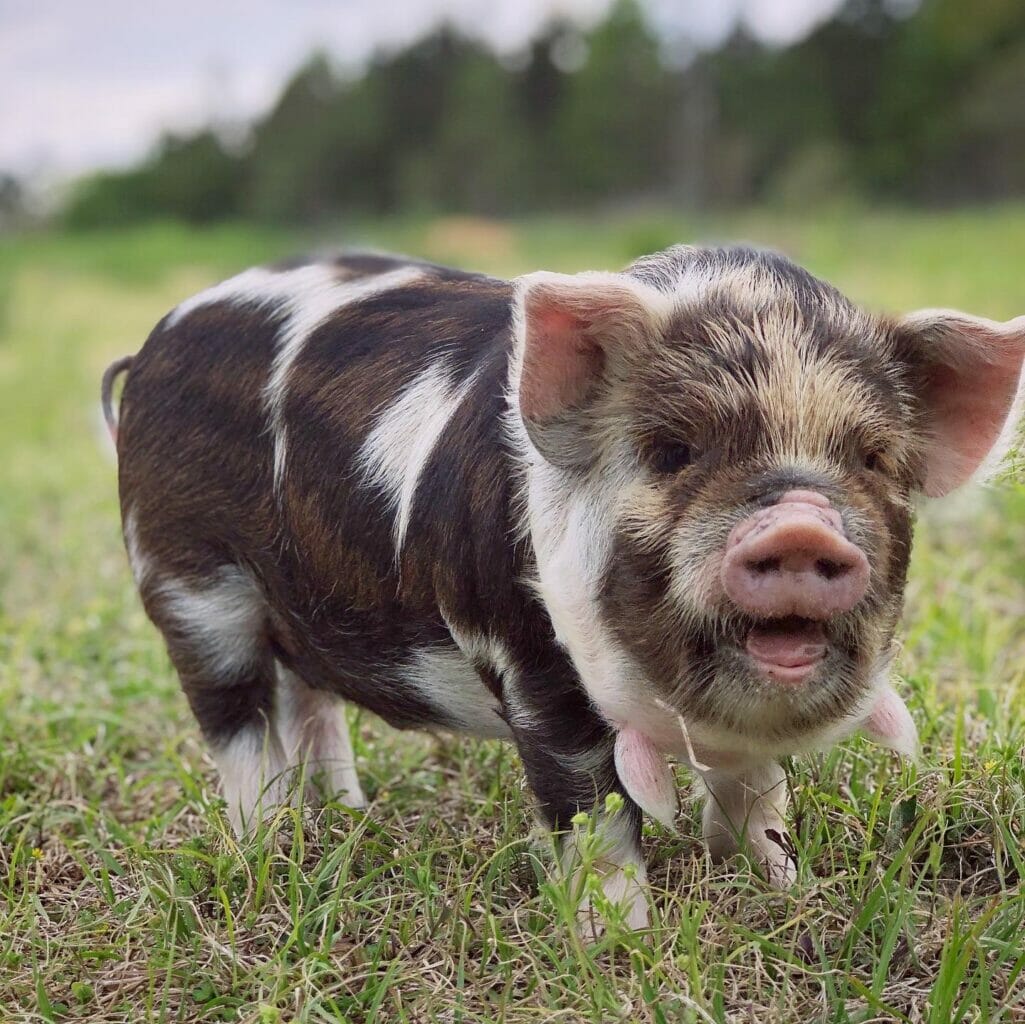Meet the Modern Farmer Using New Zealand Pigs to Restore a Former Tobacco Farm
Kunekune pigs are the secret to one North Carolina farmer’s success
Meet the Modern Farmer Using New Zealand Pigs to Restore a Former Tobacco Farm
Kunekune pigs are the secret to one North Carolina farmer’s success

This cute pig has transformed an old tobacco farm.by Rachel Herrick
When Rachel Herrick bought a 47-acre farm in Cameron, NC, she had her work cut out for her. The soil was stripped of nutrients, dry after decades of tobacco farming. But Herrick was undeterred. Farming was in her roots, and with some work and regenerative practices, she knew she could change the land for the better.
And she has, making gradual but steady progress over the last seven years. She even named her land Slow Farm. But she hasn’t undertaken this transformation alone. Instead, she’s had a team of helpers by her side: 25 roly-poly pigs, her secret weapon for soil health.
Herrick keeps kunekune pigs, a breed domesticated in New Zealand—kunekune means “fat and round” in Maori—and they are perfect for the small farmer. The pigs happily chew their way through the broadleaf weeds that pop up across her fields, which other livestock won’t touch. “They keep pasture systems balanced so that unpopular plants can’t just take over,” says Herrick.
Herrick grew up working on her family’s 60-acre farm in Maine, where they raised and sold beef, pork, poultry, eggs and produce. Like many farming families, her parents encouraged her to leave the business to go to college. After graduate school, she spent a decade pursuing a career in mixed media art before realizing that farming themes were at the forefront of her work.
“It only took me, like, 10 more years to realize that it was bananas of me to make art about a thing that I knew how to do,” she says. “[I could] be part of the actual change that I longed for.”

So Herrick put away her art supplies and returned to North Carolina, starting Slow Farm. The property was a foreclosure that had been unoccupied for a decade, but Herrick was intrigued by the listing. It included a house, two barns and a pond, and it was already enclosed with a fence, so the foundation was there. She says she knew she was home halfway up the driveway.
She brought in goats to take care of the overgrowth and give the soil a boost of nutrients. After a year and a half, she saw significant improvements in the pastures. But goats only eat overgrowth at their knee level, so she needed livestock to take care of the lower weeds.
That’s when she turned to kunekune pigs. Kunekunes are small, docile pigs with short, upturned snouts that prevent them from uprooting the dirt like traditional hogs. When trying to restore topsoil, the last thing you want is to till it up, so they have the perfect skills for the job. They pull their weight on her farm by simply eating and pooping.
“They munch broadleaf weeds and leave behind this beautiful, pretty pH-neutral poo that the dung beetles go crazy ([for],” she says. “If you can get your dung beetles excited about the project, they’ll do so much of the work for you. They make all the [pig] poop into tiny little balls and then tuck it like an inch below the soil for you. That’s exactly what you want if you’re trying to build topsoil.”
Maori people in New Zealand domesticated kunekunes to live among the villagers, so they are naturally laid back and friendly. They are popular among small farms and family-owned operations because they eat about one-fourth of the grain needed for a standard pig and are happy to roam fenced pastures without trying to escape.
“Kunes don’t generally push fences, which is another big deal. Farmers spend a lot of time fixing fences, and we don’t generally love it,” she says.
For Herrick, the pigs are an integral part of the farm, contributing to a holistic environment. That’s what she was seeking when she started Slow Farm, a place to move away from the farming techniques she grew up with and lean into practices that worked with the land instead of against it.
“I’m fascinated by the history of farming in terms of what it can teach us about slower, more sustainable methods,” says Herrick. “These are folks that took their time, so they didn’t have to repeat themselves and they weren’t trying to use a lot of inputs they didn’t have.”
Herrick keeps a permanent herd of 25 kunekunes, and she also breeds them for other farms wanting a better way to manage their lands. They are still a relatively rare breed, so she is careful to keep the diversified bloodlines she has brought in from places like California, Pennsylvania and Virginia to ensure her pigs are healthy and genetically diverse.
They live among her other livestock, including chickens, Ancona ducks, geese and guineas, and she says the pigs are easy to please and get along with everyone. Give them a pasture and some grain and they’ll happily do the work.
Follow us
This work is licensed under a Creative Commons Attribution-NoDerivatives 4.0 International License.
Want to republish a Modern Farmer story?
We are happy for Modern Farmer stories to be shared, and encourage you to republish our articles for your audience. When doing so, we ask that you follow these guidelines:
Please credit us and our writers
For the author byline, please use “Author Name, Modern Farmer.” At the top of our stories, if on the web, please include this text and link: “This story was originally published by Modern Farmer.”
Please make sure to include a link back to either our home page or the article URL.
At the bottom of the story, please include the following text:
“Modern Farmer is a nonprofit initiative dedicated to raising awareness and catalyzing action at the intersection of food, agriculture, and society. Read more at <link>Modern Farmer</link>.”
Use our widget
We’d like to be able to track our stories, so we ask that if you republish our content, you do so using our widget (located on the left hand side of the article). The HTML code has a built-in tracker that tells us the data and domain where the story was published, as well as view counts.
Check the image requirements
It’s your responsibility to confirm you're licensed to republish images in our articles. Some images, such as those from commercial providers, don't allow their images to be republished without permission or payment. Copyright terms are generally listed in the image caption and attribution. You are welcome to omit our images or substitute with your own. Charts and interactive graphics follow the same rules.
Don’t change too much. Or, ask us first.
Articles must be republished in their entirety. It’s okay to change references to time (“today” to “yesterday”) or location (“Iowa City, IA” to “here”). But please keep everything else the same.
If you feel strongly that a more material edit needs to be made, get in touch with us at [email protected]. We’re happy to discuss it with the original author, but we must have prior approval for changes before publication.
Special cases
Extracts. You may run the first few lines or paragraphs of the article and then say: “Read the full article at Modern Farmer” with a link back to the original article.
Quotes. You may quote authors provided you include a link back to the article URL.
Translations. These require writer approval. To inquire about translation of a Modern Farmer article, contact us at [email protected]
Signed consent / copyright release forms. These are not required, provided you are following these guidelines.
Print. Articles can be republished in print under these same rules, with the exception that you do not need to include the links.
Tag us
When sharing the story on social media, please tag us using the following: - Twitter (@ModFarm) - Facebook (@ModernFarmerMedia) - Instagram (@modfarm)
Use our content respectfully
Modern Farmer is a nonprofit and as such we share our content for free and in good faith in order to reach new audiences. Respectfully,
No selling ads against our stories. It’s okay to put our stories on pages with ads.
Don’t republish our material wholesale, or automatically; you need to select stories to be republished individually.
You have no rights to sell, license, syndicate, or otherwise represent yourself as the authorized owner of our material to any third parties. This means that you cannot actively publish or submit our work for syndication to third party platforms or apps like Apple News or Google News. We understand that publishers cannot fully control when certain third parties automatically summarize or crawl content from publishers’ own sites.
Keep in touch
We want to hear from you if you love Modern Farmer content, have a collaboration idea, or anything else to share. As a nonprofit outlet, we work in service of our community and are always open to comments, feedback, and ideas. Contact us at [email protected].by Cindy Whitt, Modern Farmer
December 12, 2022
Modern Farmer Weekly
Solutions Hub
Innovations, ideas and inspiration. Actionable solutions for a resilient food system.
ExploreExplore other topics
Share With Us
We want to hear from Modern Farmer readers who have thoughtful commentary, actionable solutions, or helpful ideas to share.
SubmitNecessary cookies are absolutely essential for the website to function properly. This category only includes cookies that ensures basic functionalities and security features of the website. These cookies do not store any personal information.
Any cookies that may not be particularly necessary for the website to function and are used specifically to collect user personal data via analytics, ads, other embedded contents are termed as non-necessary cookies.
Yes I would like to get in touch with this lady about her pigs thanks. email- nctrk957@gmail.com
They make wonderfully pets, New Zealand
N